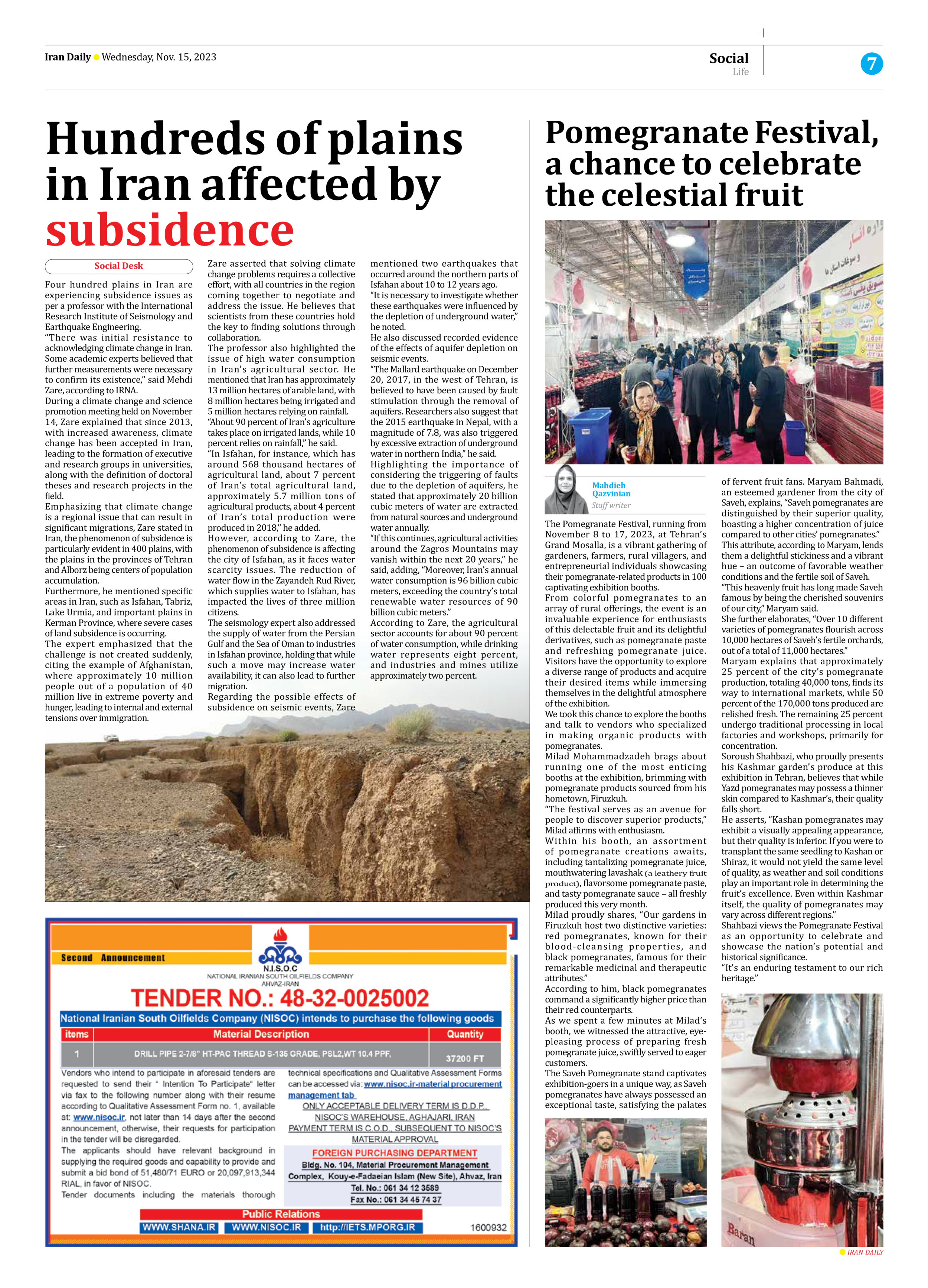
Pomegranate Festival, a chance to celebrate the celestial fruit
Mahdieh Qazvinian Staff writer
The Pomegranate Festival, running from November 8 to 17, 2023, at Tehran’s Grand Mosalla, is a vibrant gathering of gardeners, farmers, rural villagers, and entrepreneurial individuals showcasing their pomegranate-related products in 100 captivating exhibition booths.
From colorful pomegranates to an array of rural offerings, the event is an invaluable experience for enthusiasts of this delectable fruit and its delightful derivatives, such as pomegranate paste and refreshing pomegranate juice. Visitors have the opportunity to explore a diverse range of products and acquire their desired items while immersing themselves in the delightful atmosphere of the exhibition.
We took this chance to explore the booths and talk to vendors who specialized in making organic products with pomegranates.
Milad Mohammadzadeh brags about running one of the most enticing booths at the exhibition, brimming with pomegranate products sourced from his hometown, Firuzkuh.
“The festival serves as an avenue for people to discover superior products,” Milad affirms with enthusiasm.
Within his booth, an assortment of pomegranate creations awaits, including tantalizing pomegranate juice, mouthwatering lavashak (a leathery fruit product), flavorsome pomegranate paste, and tasty pomegranate sauce – all freshly produced this very month.
Milad proudly shares, “Our gardens in Firuzkuh host two distinctive varieties: red pomegranates, known for their blood-cleansing properties, and black pomegranates, famous for their remarkable medicinal and therapeutic attributes.”
According to him, black pomegranates command a significantly higher price than their red counterparts.
As we spent a few minutes at Milad’s booth, we witnessed the attractive, eye-pleasing process of preparing fresh pomegranate juice, swiftly served to eager customers.
The Saveh Pomegranate stand captivates exhibition-goers in a unique way, as Saveh pomegranates have always possessed an exceptional taste, satisfying the palates of fervent fruit fans. Maryam Bahmadi, an esteemed gardener from the city of Saveh, explains, “Saveh pomegranates are distinguished by their superior quality, boasting a higher concentration of juice compared to other cities’ pomegranates.”
This attribute, according to Maryam, lends them a delightful stickiness and a vibrant hue – an outcome of favorable weather conditions and the fertile soil of Saveh.
“This heavenly fruit has long made Saveh famous by being the cherished souvenirs of our city,” Maryam said.
She further elaborates, “Over 10 different varieties of pomegranates flourish across 10,000 hectares of Saveh’s fertile orchards, out of a total of 11,000 hectares.”
Maryam explains that approximately 25 percent of the city’s pomegranate production, totaling 40,000 tons, finds its way to international markets, while 50 percent of the 170,000 tons produced are relished fresh. The remaining 25 percent undergo traditional processing in local factories and workshops, primarily for concentration.
Soroush Shahbazi, who proudly presents his Kashmar garden’s produce at this exhibition in Tehran, believes that while Yazd pomegranates may possess a thinner skin compared to Kashmar’s, their quality falls short.
He asserts, “Kashan pomegranates may exhibit a visually appealing appearance, but their quality is inferior. If you were to transplant the same seedling to Kashan or Shiraz, it would not yield the same level of quality, as weather and soil conditions play an important role in determining the fruit’s excellence. Even within Kashmar itself, the quality of pomegranates may vary across different regions.”
Shahbazi views the Pomegranate Festival as an opportunity to celebrate and showcase the nation’s potential and historical significance.
“It’s an enduring testament to our rich heritage.”







